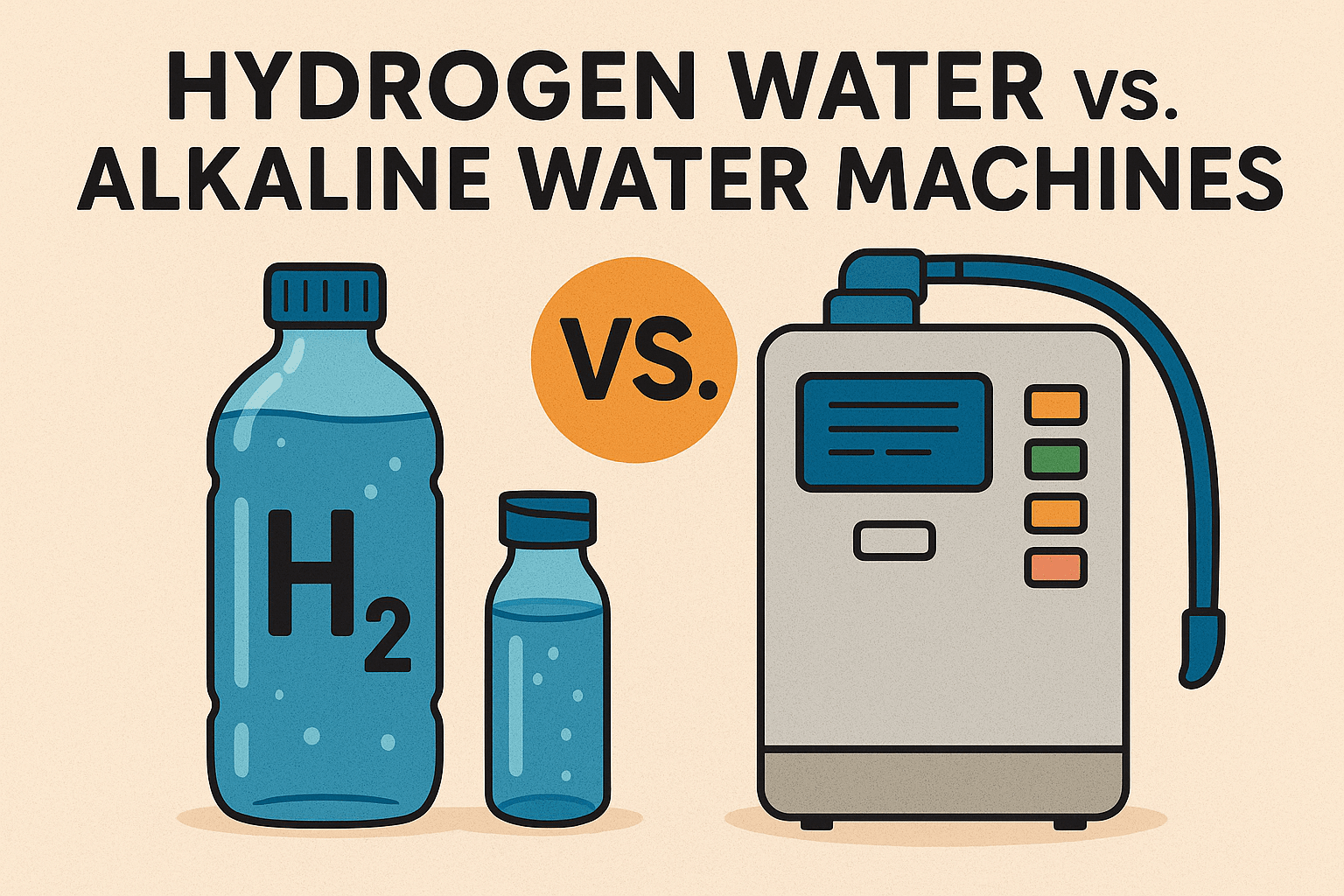
Hydrogen Water vs Alkaline Water: What’s the Difference?
They’re both “enhanced” waters—but they work very differently. Here’s a clear, side-by-side explanation to help you choose.

Many people wonder whether to drink hydrogen water or alkaline water for better health. Both are popular, but they take different approaches.
Hydrogen water contains dissolved molecular hydrogen (H₂) that may act as a selective antioxidant. Alkaline water has a higher pH than tap water, usually due to minerals.
New to H₂? Start with our Hydrogen Water: The Ultimate Guide (2025).
Key Takeaways
- Hydrogen water targets free radicals via dissolved hydrogen gas; alkaline water focuses on higher pH.
- Current research favors hydrogen water’s antioxidant benefits over pH claims.
- Pick based on health goals, taste, budget, and access.
Understanding Hydrogen Water and Alkaline Water
What Is Hydrogen Water?
Hydrogen water is regular water that contains molecular hydrogen gas (H₂) dissolved into it—typically ~0.5–1.6 ppm. It tastes like normal water and generally stays near neutral pH (~7.0–7.4).
The tiny H₂ molecules can diffuse quickly; once opened, some hydrogen escapes—so it’s best consumed shortly after production.
Portable option: Echo Go Bottle.
Defining Alkaline Water
Alkaline water has a pH above 7, typically 8.0–9.5, often due to minerals like calcium, magnesium, and potassium. It does not contain added H₂ gas.
- pH 8.0–9.5 (alkaline)
- Contains dissolved minerals (varies by source)
- Taste can be “smoother” than tap water
Read more: Alkaline Water — Myths & Facts
How Are They Produced?
Hydrogen Water Production
SPE/PEM electrolysis splits water and dissolves H₂ back into the drinking water. Some users also employ magnesium tablets/sticks that react to release hydrogen (slower than electronic generators).
Shop devices: Echo H2 (countertop) · Echo Ultimate (premium) · Hydrogen Pitcher
Alkaline Water Production
Ionizers separate water into acidic and alkaline streams via electrolysis. Water can also become alkaline by mineral addition (e.g., filters, sodium bicarbonate) or by passing through mineral-rich media.
Core Differences: Hydrogen vs Alkaline
| Feature | Hydrogen Water | Alkaline Water |
|---|---|---|
| pH Level | ~7.0–7.4 (neutral) | ~8.0–9.5 (alkaline) |
| Active Component | Dissolved molecular hydrogen (H₂) | Alkalinity from minerals |
| Taste | Similar to regular water | Slightly different, often “smoother” |
| Mineral Content | No added minerals by design | Often contains added minerals |
Related: Hydrogen vs Alkaline Water Machines
Health Benefits, Risks, and Practical Uses
Hydrogen Water: Antioxidant & Recovery
Hydrogen water contains dissolved H₂ that may act as a selective antioxidant targeting harmful free radicals. Early studies and user reports suggest benefits for oxidative stress and post-exercise recovery.
- Reduced inflammation markers
- Potential protection against cellular damage
- Supports exercise recovery and fatigue reduction
Deep dive: Hydrogen Water Benefits
Alkaline Water: Minerals & Comfort
Benefits mainly stem from the mineral content and higher pH. Some users report digestive comfort (e.g., temporary acid neutralization) and enjoy the taste.
- Mineral supplementation (Ca, Mg, K)
- May help with occasional heartburn
- Taste preference for some users
Hydration & Athletic Performance
- Both hydrate as effectively as regular water.
- Hydrogen water may help with exercise-induced oxidative stress and soreness.
- Alkaline water contributes electrolytes from minerals.
When to Choose Which?
- Prioritize recovery/antioxidants → hydrogen water.
- Prefer higher-pH mouthfeel/minerals → alkaline water.
- Budget, taste, and availability also matter.
Additional Considerations
Bone, Brain & Other Factors
- Bone health: alkaline minerals support diet, but not a substitute for nutrition & training.
- Cognitive support (early research): antioxidant activity from hydrogen may be relevant over time.
- Kidney stones: high mineral intake may raise risk for susceptible people—ask your clinician.
Practical Tips
- Hydrogen water: drink fresh after generation/opening; keep cool and capped.
- Alkaline water: mind overall mineral load if you have kidney concerns.
- Both are generally well tolerated; consult your provider if managing conditions or medications.
Frequently Asked Questions


